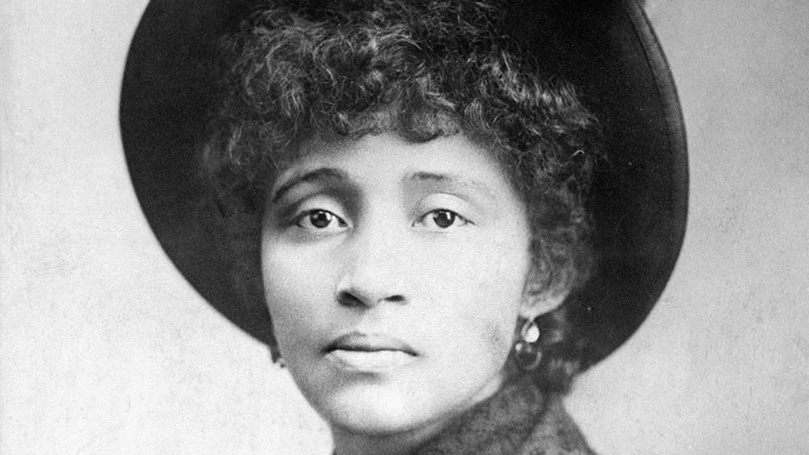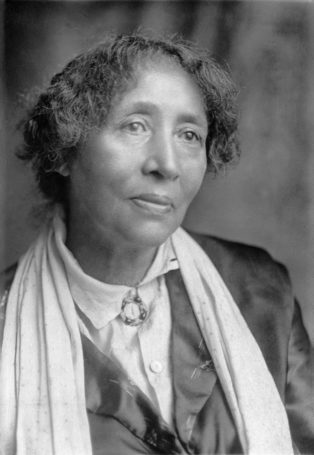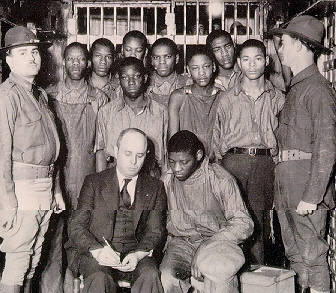
Let the masses understand that these robbers hold this property (which is so much unpaid labor) under the plea of the laws which they themselves have made . . . and further, that these so-called laws would not be worth the paper they are written on, twenty-four hours after the producers of all wealth had willed it otherwise.
Lucy Parsons wrote the words above for the Socialist, the newspaper of the Socialist Labor Party in 1879. Formed in the aftermath of the great railroad strike of 1877, the first national strike, the SLP was the first socialist party in U.S. history.
Lucy and her husband, Albert Parsons, had fled Texas, where as activists of radical Republican reconstruction, they had been targets of the KKK. Frustrated with what they saw as the hopelessness of working through political parties for socialism, given the corruption of all forms of government, Albert and Lucy gravitated in the early 1880s toward the anarchist movement. One wing sought to achieve socialism by calling upon workers and the poor to engage in armed self-defense, “smash” both the capitalist class and the government through armed insurrection, and reconstitute society on the basis of voluntary collectives. The International Working Peoples Association (IWPA) became the center of this movement, and both Albert and Lucy organized rallies and wrote articles and pamphlets on its behalf. Parsons sums up the anarchist labor position in an 1884 article:
Have you not worked hard all your life, since you were old enough for your labor to be of use in the production of wealth? Have you not toiled long, hard and laboriously in producing wealth? And in all those years of drudgery do you not know you have produced thousands upon thousands of dollar’s worth of wealth, which you did not then, do not now, and unless you ACT, never will, own any part in? . . .
And that at last when the caprice of your employer saw fit to create an artificial famine by limiting production, that the fires in the furnace were extinguished, the iron horse to which you had been harnessed was stilled; the factory door locked up, you turned upon the highway a tramp, with hunger in your stomach and rags upon your back? . . .
Awaken them [the industrial bosses] from their wanton sport at your expense! Send forth your petition and let them read it by the red glare of destruction. Thus when you cast “one long lingering look behind” you can be assured that you have spoken to these robbers in the only language which they have ever been able to understand, for they have never yet deigned to notice any petition from their slaves that they were not compelled to read by the red glare bursting from the cannon’s mouths, or that was not handed to them upon the point of the sword.
 Even before the Haymarket riot and the political execution of her husband in 1887, Lucy Parsons, a woman of color, had written against the racist terror she and her husband had experienced in Texas during Reconstruction and the lynchings in the 1880s. Throughout her life she would continue to write, speak, and organize against racist atrocities; in the 1930s she worked with International Labor Defense to save Angelo Herndon and the Scottsboro defendants in the 1930s. In the anarchist movement and in the Industrial Workers of the World, she was one of the few activists who focused extensively on what was then called “the Negro question.”
Even before the Haymarket riot and the political execution of her husband in 1887, Lucy Parsons, a woman of color, had written against the racist terror she and her husband had experienced in Texas during Reconstruction and the lynchings in the 1880s. Throughout her life she would continue to write, speak, and organize against racist atrocities; in the 1930s she worked with International Labor Defense to save Angelo Herndon and the Scottsboro defendants in the 1930s. In the anarchist movement and in the Industrial Workers of the World, she was one of the few activists who focused extensively on what was then called “the Negro question.”
In 1886 she wrote a powerful response to a massacre of 13 African Americans by a racist mob in Mississippi after a Black man had tried to file a formal complaint against a white policeman for brutality:
Who . . . could help but stand aghast and heave a sigh and perchance drop a tear as they read the graphic account flashed to us of the awful massacre of the poor and defenseless wage-slaves . . . in the state of Mississippi? Defenseless, poverty-stricken, hemmed about by their deadly enemies; victims not only of their misfortunes, but to deep-seated, blind, relentless prejudice, these our fellow-beings are murdered without quarter. . . .
Are there any so stupid as to believe these outrages have been, are being and will be heaped upon the Negro because he is black? Not at all. It is because he is poor. It is because he is dependent. Because he is poorer as a class than his white wage-slave brother of the North.
To the Negro himself we would say your deliverance lies mainly in your own hands. You sow but another reaps. You till the soil but for another to enjoy. The overseer’s whip is now fully supplanted by the lash of hunger! And the auction block by the chain-gang and convict cell! . . .
But your course in the future, if you value real freedom, is to leave politics to the politician, and prayer to those who can show wherein it has done them more good than it has ever done for you, and join hands with those who are striving for economic freedom. . . .
As to those local, periodical, damnable massacres to which you are at all times liable, these you must revenge in your own way. You are not absolutely defenseless. For the torch of the incendiary, which has been known to show murderers and tyrants the danger line, beyond which they may not venture with impunity, cannot be wrested from you.
She also wrote on the “the woman question” or the oppression of women both throughout history and under capitalism. Here, scholars show that her ideas were directly influenced by Women and Socialism, authored by August Bebel, a leading German Marxist and founder of the German Social Democratic Party (SPD). Below are excerpts from an article Parsons wrote in 1905, the year that she became a founding member of the IWW:
As man ascended in the social scale of development, he began to acquire property, which he wished to transmit along with his name to his offspring — then woman became his household drudge.
She was regarded as a sort of necessary evil; as something to be used and abused; to be bought and sold — as a thing fit only to cater to his pleasures and his passions — this was woman’s lowly position. For countless centuries, the drudge went her lonesome, weary way, bore the children — and man’s abuse.
[But women’s emergence into paid labor] was to bring relief at last. This enabled woman to leave the narrow confines of the kitchen where she had been kept for so long. She entered the arena of life’s activities, to make her way in this hustling, pushing, busy world as an independent human being for the first time in the world’s history.
But [under capitalism] woman is allowing herself to be used to reduce the standard of life by working for lower wages than those demanded by men; this she will have to rectify, else her labor will become a detriment instead of a blessing or help either to herself or her fellow workers. . . .
We, the women of this country, have no ballot even if we wished to use it . . . but we have our labor. We are exploited more ruthlessly than men. Wherever wages are to be reduced the capitalist class use women to reduce them, and if there is anything that you men should do in the future it is to organize the women.
At the founding convention of the IWW (called the “Continental Congress of the Working Class”) in Chicago, Lucy Parsons was the only woman to speak. Below are important excerpts from her address:
When you go out of this hall, when you have laid aside your enthusiasm, then comes the solid work. Are you going out of here with your minds made up that the class which we call ourselves, revolutionary Socialists so-called — that class, is organized to meet organized capital with the millions at its command? It has many weapons to fight us. First it has money. Then, it has legislative tools. Then, it has armories; and last, it has the gallows. . . . I simply throw these hints out that you young people may become reflective and know what you have to face at the first, and then it will give you strength.
That is the solid foundation that I hope this organization will be built on; that it may be built not like a house upon the sand, that when the waves of adversity come it may go over into the ocean of oblivion; but that it shall be built upon a strong, granite, hard foundation.
We mean the land shall belong to the landless, the tools to the toiler, and the products to the producers.
What do we mean when we say revolutionary Socialists? We mean the land shall belong to the landless, the tools to the toiler, and the products to the producers. Now, let us analyze that for just a moment. Is there a single land owner in this country . . . who will allow you to vote it away from him?
[The product] belongs to the capitalist class as their legal property. Do you think that they will allow you to vote them away from them by passing a law and saying, “Be it enacted that on and after a certain day Mr Capitalist shall be dispossessed?” Hence, when you roll under your tongue the expression that you are revolutionists, remember what that word means. It means a revolution that shall turn all these things over where they belong — to the wealth producers.
Now, how shall the wealth producers come into possession of them? I believe that if every man and woman who works . . . should decide in their minds that they shall have that which of right belongs to them . . . then there is no army that is large enough to overcome you, for you yourselves constitute the army.
Parsons had serious doubts from the IWW’s early years about its lack of a concrete program and its “dual unionism” policies toward the AFL, which she saw as self-defeating. As early as 1912, she joined with other radicals, Elizabeth Gurley Flynn and William Z. Foster (later to become major leaders of the CPUSA), to form the Syndicalist League of America. Emma Goldman and other anarchists would accuse her of “opportunism” for her subsequent support of the Soviet attempts to construct socialism and for the CPUSA (as if support for the CPUSA would ever be considered in the U.S. an opportunist act).
 Her relationship to Elizabeth Gurley Flynn was especially important in this regard. She joined the International Labor Defense, a mass organization created by the CPUSA to undertake the defense of native and foreign-born workers and became a member of its Executive Board in 1927. She was actively involved in the Sacco Vanzetti Defense Campaign, the Angelo Herndon Defense Campaign (the young African-American leader of an Unemployed Council Hunger March in Georgia imprisoned for “insurrection” against the State of Georgia), and the Scottsboro Defense Campaign. In a letter she summed up her move away from anarchism toward what was in reality a “new left” in the 1920s and 1930s, a left in which the CPUSA played a central role:
Her relationship to Elizabeth Gurley Flynn was especially important in this regard. She joined the International Labor Defense, a mass organization created by the CPUSA to undertake the defense of native and foreign-born workers and became a member of its Executive Board in 1927. She was actively involved in the Sacco Vanzetti Defense Campaign, the Angelo Herndon Defense Campaign (the young African-American leader of an Unemployed Council Hunger March in Georgia imprisoned for “insurrection” against the State of Georgia), and the Scottsboro Defense Campaign. In a letter she summed up her move away from anarchism toward what was in reality a “new left” in the 1920s and 1930s, a left in which the CPUSA played a central role:
Anarchism has not produced any organized ability in the present generation, only a few little loose, struggling groups, scattered over this vast country, that come together in “conferences” occasionally, talk to each other, then go home.
Anarchists are good at showing the shortcomings of others’ organizations. But what have they done in the last fifty years. . . . Nothing to build up a movement; they are mere pipe-dreamers dreaming. Consequently, Anarchism doesn’t appeal to the public. . . . [It] is a dead issue in American life today.
I went to work for the International Labor Defense (ILD) because I wanted to do a little something to help defend the victims of capitalism who got into trouble, and not always be talking, talking, talking.
Parsons also defended the Soviet Union against attacks by Goldman and others on the left. In an article for the May Day, 1930, issue of the Daily Worker Parsons wrote:
On this day the workers of every land and every clime will abandon the factories, mines and other hell holes of capitalism and march by the thousands under the banner of the Communist International and will declare their intention to abolish the curse of capitalism, poverty, misery. . . . [In the labor movement in the U.S.] [t]here came to the front the A.F. of L. which has retarded and deadened the labor movement. In a population of 38 million of workers it has gathered some 2 millions of the mechanics and ignored the other 36 millions — virtually told them to go to hell! Now the Communists have risen as a challenge to this bunch of lazy racketeer A.F.L. officials, with their morally bankrupt organization. The Communists are here to stay.
It is widely believed that Parsons formally joined the CPUSA in 1939, three years before her death, after nearly two decades of working with CPUSA activists. Here is the eulogy in the Daily Worker written by her old IWW and CPUSA comrade Elizabeth Gurley Flynn:
Lucy Parsons spoke in a beautiful melodious voice, with eloquence and passion. She had her roots in the people, which gave her strength. Both of her children died. She kept on alone, without wavering. She never lost faith in the power, courage, intelligence and ultimate triumph of the people. Years ago she accustomed trade union men to listen respectfully to a woman speaking for labor. She helped make them more keenly aware of the need of strong unions and organizing the unorganized. She helped to build up a strong tradition of labor defense so that other leaders of labor should not suffer the same fate as her husband.
When Eugene V. Debs spoke at the 1905 IWW convention, Mother Jones sat on one side of him and Lucy Parsons on the other. Bill Haywood presided. She encouraged every new effort to push forward the whole labor movement. What a great satisfaction to her it must have been for her to realize the number of splendid young women, many of her color, who are enrolled in it today. What a joy to see trades unions millions strong! She did not live in the past. She lived for the future. She will live in the future, in the hearts of the workers.
In gathering the quotes, I have used primarily Keith Rosenthal’s excellent biographical article, “Lucy Parsons: ‘More Dangerous than a Thousand Rioters’” (2011).
Images: Top, August Brauneck, Wikipedia (public domain); Parsons in 1920, Wikipedia (public domain); Scottsboro defendants, Wikipedia (fair use).


 Join Now
Join Now